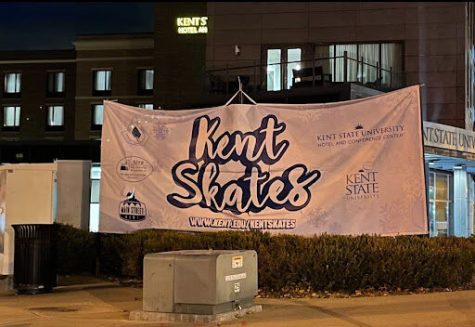Going greek at KSU
August 6, 2019
The opportunities available on a college campus are seemingly endless, especially at Kent State, where there are over 400 student organizations and clubs to be a part of.
Getting involved on campus is one of the quickest ways to become part of the university community and personalize your college experience. One way students can get involved is by joining Greek life.
The fraternity and sorority community at Kent State focuses on five core values: scholarship, philanthropy and service, brotherhood and sisterhood, leadership and community.
There are several Greek organizations on campus, each with their own motto, philanthropy and values. The university’s goal for any student is to be able to research the active Greek organizations on campus to find one that fits their personal interests.
At Kent State, there are three governing councils that oversee the fraternities and sororities on campus. The Interfraternity Council (IFC) oversees Kent State’s fraternities and the Panhellenic Council oversees Kent State’s sororities.
The Integrated Greek Council (IGC) is an umbrella council for the National Pan-Hellenic Council (NPHC) and the National Association of Latino Fraternal Organizations (NALFO). IGC also works to promote the awareness of multicultural diversity within the college and surrounding community.
Alcedos Vanterpool, vice president of IGC, has been involved with Greek life since his freshman year at Kent State. He’s a member of Phi Beta Sigma fraternity.
“When I was a freshman, I went to Black Squirrel Fest and all these other events where people had tables and the people at the Sigma table just spoke to me more,” Vanterpool said. “When I looked it up that’s part of the reason why I wanted to join Greek life. We tell prospective members to do their research, look up what each organization stands for and how they were founded.”
Vanterpool described being a part of Greek life as a very rewarding lifelong commitment.
“One of the biggest things I’ve gotten out of it is just being able to have a mentor,” Vanterpool said. “All our organizations have an alumni chapter and they really invest in us. I’ve been able to find a lot of mentors and people with similar interests that I don’t think I would’ve had access to without Greek life.”
The organizations under IGC don’t actively recruit. Instead, students that are interested in joining express their interest by showing up to events and the organization will reach out if they’re considering a membership.
“What I would say for someone who doesn’t know anybody who is Greek is to really put yourself out there and get to know people who are a part of the community,” Vanterpool said. “Get to know the people in the chapter first because at the end of the day, it’s lifelong. So you want to make sure that when you make this commitment you know the people who are a part of it.”
Jared Carello, president of IFC, rushed his freshman year. He was coming to Kent from out of state and looking for a way to get connected with people.
“There’s a ton of resources in (Greek life). It gives you an opportunity to have a pretty active social life,” Carello said. “There’s networking once you graduate, for philanthropy reasons it looks great on a resume. Greek life at Kent State raises hundreds of thousands of dollars each year.”
Carello also said it’s important to research Greek life and talk to people already involved to make sure it’s a good fit.
“A lot of people come in with preconceived notions, I know I did,” Carello said. “You watch TV and Greek life is in a negative spotlight. I can’t speak for every university but I can speak Kent, it’s a great community. We raise a lot of money for a lot of good causes and do a lot of good things here. You watch TV and think it’s all about hazing and drinking and that’s not the case. My experience hasn’t been that and when I talk to other people in the community it hasn’t been that either. You just have to talk to people and see if it’s a fit. It’s not for everybody but when you know, you know.”
Each chapter has their own policies, bylaws and traditions to uphold and follows the five core values of Greek life at Kent State. Some chapters have houses that serve as a communal space for members to live, meet and spend time at. Although, some do not but they all operate the same.
There are also academic, professional, honorary groups and service based organizations available to join on campus. A full list of these organizations can be found on Kent State’s Center for Student Involvement website.
Kent State’s Fraternity and Sorority Life website details all the information about each active group and each council on Kent Campus to make it easy for prospective members to research and learn about the different options available.
“I was never interested in Greek life before I came to Kent,” Carello said. “But it found me and I knew it was just a natural fit. If you’re interested, check it out and talk to people, it may change your mind.”
Greek Life Vocabulary
Recruitment: The formal process of engaging potential new members to join a Greek organization.
Big: The nickname for an active member in your Greek organization that serves as your mentor. Like a big brother or sister.
Bid: An official invitation to join a Greek organization.
Philanthropy: An organization’s charity or service project.
Chapter: The local branch of a larger national (or international) Greek organization.
Pledge: New member that hasn’t been initiated yet.
Rush: Essentially means recruitment, which begins at the beginning of the spring and fall semesters.
Active: An initiated member or chapter that has paid its dues.
Dues: The cost of membership in a fraternity or sorority.
Maria McGinnis is a reporter. Contact her at [email protected].


















